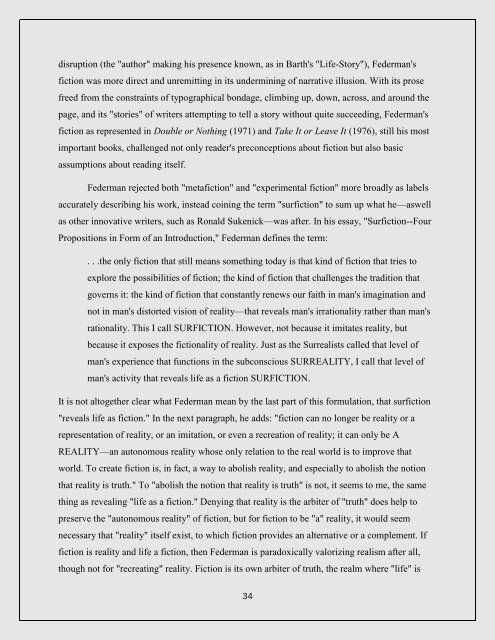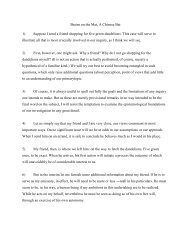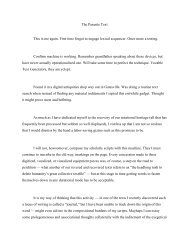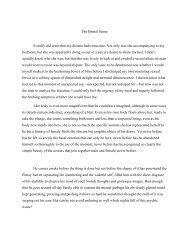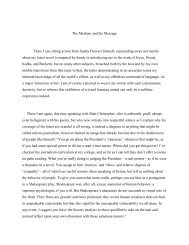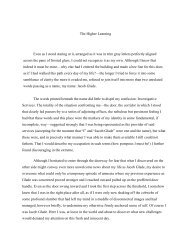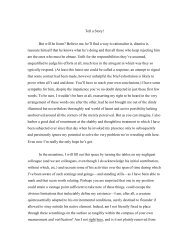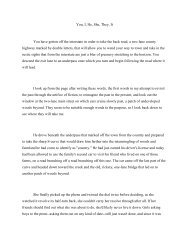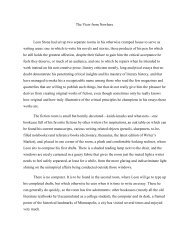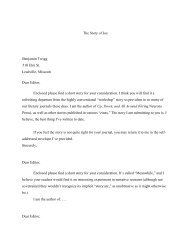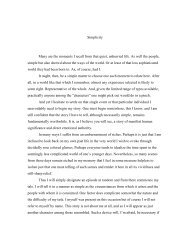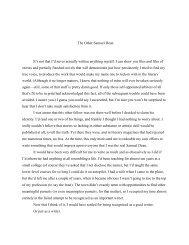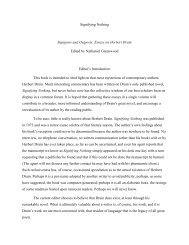APF
Create successful ePaper yourself
Turn your PDF publications into a flip-book with our unique Google optimized e-Paper software.
disruption (the "author" making his presence known, as in Barth's "Life-Story"), Federman's<br />
fiction was more direct and unremitting in its undermining of narrative illusion. With its prose<br />
freed from the constraints of typographical bondage, climbing up, down, across, and around the<br />
page, and its "stories" of writers attempting to tell a story without quite succeeding, Federman's<br />
fiction as represented in Double or Nothing (1971) and Take It or Leave It (1976), still his most<br />
important books, challenged not only reader's preconceptions about fiction but also basic<br />
assumptions about reading itself.<br />
Federman rejected both "metafiction" and "experimental fiction" more broadly as labels<br />
accurately describing his work, instead coining the term "surfiction" to sum up what he—aswell<br />
as other innovative writers, such as Ronald Sukenick—was after. In his essay, "Surfiction--Four<br />
Propositions in Form of an Introduction," Federman defines the term:<br />
. . .the only fiction that still means something today is that kind of fiction that tries to<br />
explore the possibilities of fiction; the kind of fiction that challenges the tradition that<br />
governs it: the kind of fiction that constantly renews our faith in man's imagination and<br />
not in man's distorted vision of reality—that reveals man's irrationality rather than man's<br />
rationality. This I call SURFICTION. However, not because it imitates reality, but<br />
because it exposes the fictionality of reality. Just as the Surrealists called that level of<br />
man's experience that functions in the subconscious SURREALITY, I call that level of<br />
man's activity that reveals life as a fiction SURFICTION.<br />
It is not altogether clear what Federman mean by the last part of this formulation, that surfiction<br />
"reveals life as fiction." In the next paragraph, he adds: "fiction can no longer be reality or a<br />
representation of reality, or an imitation, or even a recreation of reality; it can only be A<br />
REALITY—an autonomous reality whose only relation to the real world is to improve that<br />
world. To create fiction is, in fact, a way to abolish reality, and especially to abolish the notion<br />
that reality is truth." To "abolish the notion that reality is truth" is not, it seems to me, the same<br />
thing as revealing "life as a fiction." Denying that reality is the arbiter of "truth" does help to<br />
preserve the "autonomous reality" of fiction, but for fiction to be "a" reality, it would seem<br />
necessary that "reality" itself exist, to which fiction provides an alternative or a complement. If<br />
fiction is reality and life a fiction, then Federman is paradoxically valorizing realism after all,<br />
though not for "recreating" reality. Fiction is its own arbiter of truth, the realm where "life" is<br />
34


